["Industry In-depth Research] Wei Jianjun, Amid Traffic Concerns, Is He About to Return to Fuel Vehicles?", ["Great Wall Motors, Wei Jianjun, New Energy Vehicle Sales, V8 Fuel Engine, Hive Energy
![]() 01/03 2025
01/03 2025
![]() 561
561
Author | Wu Ji | For more financial information | BT Finance Data Link The article is 3,384 words long and should take about 9 minutes to read
After a two-month hiatus from live streaming, why did Wei Jianjun suddenly announce a bet on the V8 fuel engine?
Recently, netizens have noticed that Wei Jianjun, chairman of Great Wall Motors, has not conducted any live streaming activities for over two months. As a trailblazer among traditional automakers in 2024 who resolutely emulated Xiaomi's marketing strategy and explicitly stated that "even the finest wine can go unnoticed in a dark alley," Wei Jianjun's live streams have significantly decreased in frequency in the latter half of the year. Notably, Wei Jianjun, who once aspired to emulate Lei Jun and become a top-tier entrepreneur in the traditional automotive industry, has now gone two months without a live stream, marking a stark contrast to his earlier frequency. It is certain that Great Wall Motors faced challenges in 2024 and failed to meet its annual sales targets. In the first 11 months of this year, Great Wall Motors sold a cumulative total of 280,000 new energy vehicles, representing a year-on-year increase of 20.7%. While this seemingly robust growth fell short of expectations. In November, 36,000 new energy vehicles were sold, marking a year-on-year increase of 12.9%. According to data from "Electric Car News," Great Wall Motors sold 35,999 new energy vehicles, even fewer than Changan's 36,026 units, causing it to fall out of the top five rankings. During the same period, BYD sold 504,000 units, while Geely sold 122,000 units. Great Wall Motors' new energy vehicle sales accounted for less than one-tenth of BYD's sales. Among the top ten automakers, Great Wall Motors ranked second to last in growth rate at 20.6%, only ahead of Aion, which saw a decline of 15.7%.
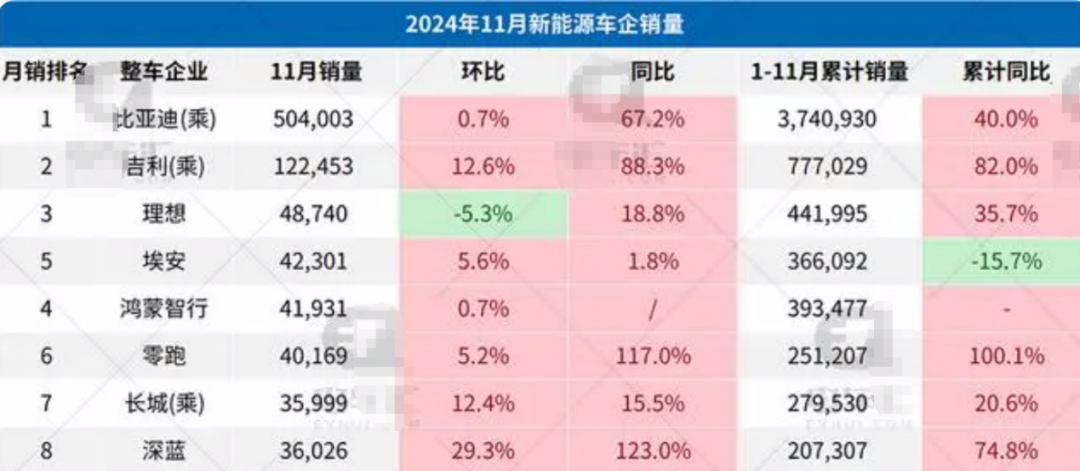
By the end of November, Great Wall Motors had sold and produced 1.098 million and 1.1 million vehicles, respectively, representing year-on-year decreases of 1.8% and 5.7%. For comparison, the same period last year saw growth rates of 12.9% and 15.1%, respectively. With only one month remaining, Great Wall Motors has achieved only 57.8% of its annual sales target of 1.9 million units, making it unrealistic to achieve the remaining 800,000 units in the final month. Instead of live streaming, Wei Jianjun has spent more time granting interviews, conversing with CCTV host Dong Qian, engaging in two discussions with Sina Finance CEO Deng Qingxu, and speaking with Auto Business Review Editor-in-Chief Jia Ke. He has continuously shared his views, criticized the industry's disorderly competition and internal strife, affirmed Great Wall Motors' industry-leading intelligent driving capabilities, and deemed automakers' price wars destructive.
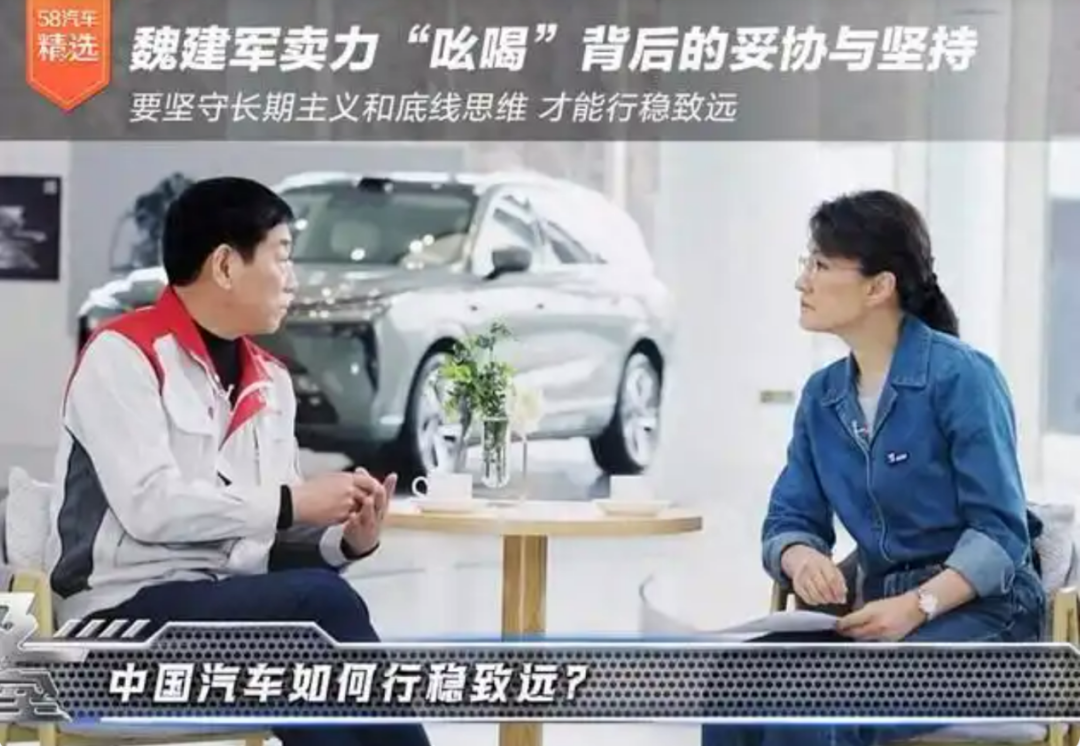
During a recent Great Wall Motors technology conference, Wei Jianjun suddenly announced that the company would launch a 4.0-liter V8 engine (fuel engine) in April or May 2025. This news surprised many in the industry as it indicated that Great Wall Motors was taking a significant step back into fuel vehicle technology. What is Wei Jianjun's true intention?
1
The Twisted Path to Top-Tier Status
Born in 1964, Wei Jianjun is now 60 years old. Typically, someone of his age might not be adept at live streaming. However, inspired by the sales success of Xiaomi's SU7, Wei Jianjun embarked on live streaming, initially putting in considerable effort. During intelligent driving live streams, he donned motorcycle gear. After years of absenting himself from Great Wall Motors' launches, he delivered a personal speech at the all-new Blue Mountain's launch event and interacted with numerous automakers' CEOs during the Beijing Auto Show, all in an attempt to drive traffic to Great Wall Motors, clearly imitating Lei Jun's approach. In August, a blogger suggested that he invite Zhou Hongyi for a test drive. It's unclear whether Wei Jianjun struggled internally with the importance of traffic versus quality, but he rejected the proposal on the spot, stating seriously, "We don't need his test drive." He instructed the blogger to record that "recognition from our vast user base is what matters. You can't use traffic to represent a product's value." By abandoning Zhou Hongyi, a top figure in the automotive circle, Wei Jianjun's path to internet fame appears quite twisted. After all, he initially emulated Lei Jun but now rejects traffic. Auto media personality Zhang Zhiyong believes, "The automotive circle is highly competitive, with CEOs of major automakers also engaging in live streams. However, for older-generation entrepreneurs, it's still quite a challenge. Yin Tongyue, chairman of Chery Automobile, who also live-streamed with Wei Jianjun, has also been relatively quiet recently, indicating that this isn't a job for everyone. More importantly, after the traffic surge, automakers still need to focus on sales and profits." Later, Wei Jianjun clarified in an interview that he was not targeting Zhou Hongyi and that he wanted to prove that Great Wall Motors did not need traffic. However, he never said that Great Wall Motors did not need traffic; rather, he implied that it needed quality traffic. It's evident that Wei Jianjun's intense marketing efforts throughout the year brought some traffic to Great Wall Motors but failed to convert it into sales. Among traditional automakers like SAIC, Geely, Chery, and Changan, Great Wall Motors ranked last in terms of new energy vehicle sales as a percentage of total sales. With the domestic new energy vehicle penetration rate exceeding 50%, Great Wall Motors' new energy vehicle sales accounted for only 25.46% of its total sales.
2
Why Suddenly Abandon Sales Targets?
Subtly, Wei Jianjun's attitude towards traffic has shifted. The best evidence is that when presenting the 2025 strategy, he mentioned for the first time, "Abandon sales, preserve profits. Great Wall Motors is not afraid of declining sales. Most of the top ten automakers are losing money." He even stated, "Even if sales fall out of the top ten, it's not a concern. We won't pursue meaningless sales." According to sales data released by Great Wall Motors, in the first three quarters of 2024 (ending in September), the company sold a cumulative total of 853,800 vehicles, a year-on-year decrease of 1.18%. Sales of new energy vehicles reached 211,500 units, a year-on-year increase of 24.15%. The proportion of new energy vehicle sales in the first three quarters was 12.64%, 21.86%, and 22.37%, respectively, showing a quarterly increase. However, sales growth slowed down from October, with 116,799 units sold in October, a month-on-month increase of 7.75%. In October, 32,039 new energy vehicles were sold, a month-on-month increase of 6.34%. It's worth noting that Great Wall Motors' overseas sales in the first three quarters reached 324,200 units, a year-on-year increase of 53.16%. The sales growth in the third quarter did not bring "substantial" profits to Great Wall Motors but instead resulted in a decline in net profit. Financial reports show that in the third quarter of this year, Great Wall Motors' revenue was 50.83 billion yuan, with a year-on-year growth rate of 2.61%, the lowest in the past six quarters. Net profit attributable to shareholders was 3.35 billion yuan, a year-on-year decrease of 7.82%. Although Great Wall Motors has reported net profits exceeding 3 billion yuan for three consecutive quarters, the decline in the third quarter's net profit may have prompted Wei Jianjun to call for "abandoning sales and preserving profits." After all, a company's purpose is to make a profit, and a decline in profits will directly impact its stock price.
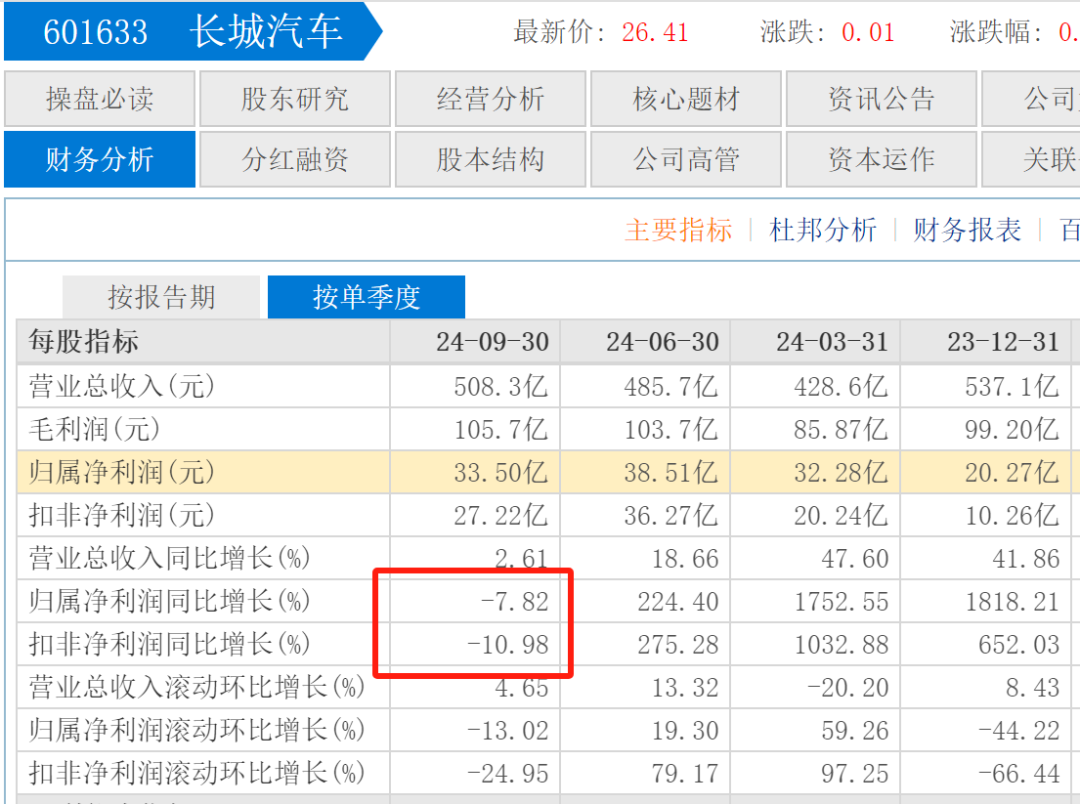
On October 26, Great Wall Motors released its third-quarter report, followed by a four-day losing streak in its stock price. As of December 30, Great Wall Motors' stock price had only increased by 5.6% year-to-date, compared to 45% for BYD and 74% for Geely Automobile. Compared to the year-to-date gains of the latter two, Great Wall Motors' recognition in the capital market is significantly weaker. The decline in net profit and the underperformance of stock price gains may have swayed Wei Jianjun. In 2021, when Wei Jianjun announced Great Wall Motors' 2025 strategy, he firmly stated, "We must transform or die. Even if we die in the process, it's worth it."
At that time, he proposed that Great Wall Motors should achieve annual sales of 4 million vehicles by 2025, with 80% being new energy vehicles. However, facing sales that fell short of expectations, Wei Jianjun stated at a shareholders' meeting, "Great Wall Motors knows what to do and what not to do. We will moderately reduce sales of heavily loss-making products and vigorously promote those that are profitable or slightly loss-making with high margins." In retrospect, Wei Jianjun's determination to transform back then seemed more like a response to the impact of new energy automakers. At this point, Wei Jianjun must miss 2006 when Great Wall sold 86,000 vehicles, less than Geely's 200,000 and Chery's 300,000, but Great Wall's net profit reached 685 million yuan. After abandoning sales targets, Great Wall Motors' overall net profit for the first three quarters of this year reached 10.43 billion yuan, a 108.78% increase from the same period last year, giving Wei Jianjun confidence to abandon sales targets.
3
Is There a Connection to Hive Energy's IPO?
Wei Jianjun's significant change in attitude towards sales and new energy vehicles may be related to Hive Energy's termination of its IPO. As the largest IPO under review on the STAR Market, Hive Energy was once valued at up to 60 billion yuan. However, according to information on the Shanghai Stock Exchange's official website on December 22, Hive Energy and its sponsor, CITIC Securities, withdrew their listing application, and the Shanghai Stock Exchange terminated the review of its issuance and listing.
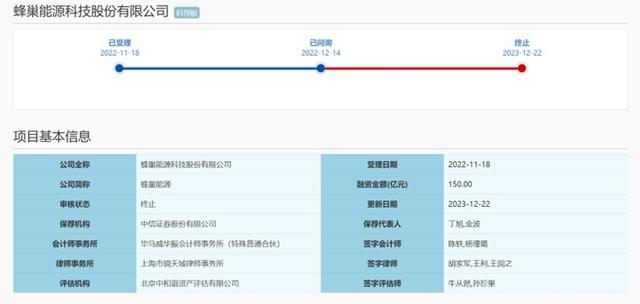
Hive Energy was formerly the Power Battery Business Unit of Great Wall Motors, operating independently starting in February 2018. The largest shareholder of Hive Energy is Baoding Ruimao, holding 38.98% of the shares, far ahead of the second-largest shareholder's 5.94%. Baoding Ruimao is a wholly-owned subsidiary of Great Wall Holdings, and after equity penetration through Tianyancha, it is clear that the actual controller of Hive Energy is Wei Jianjun.

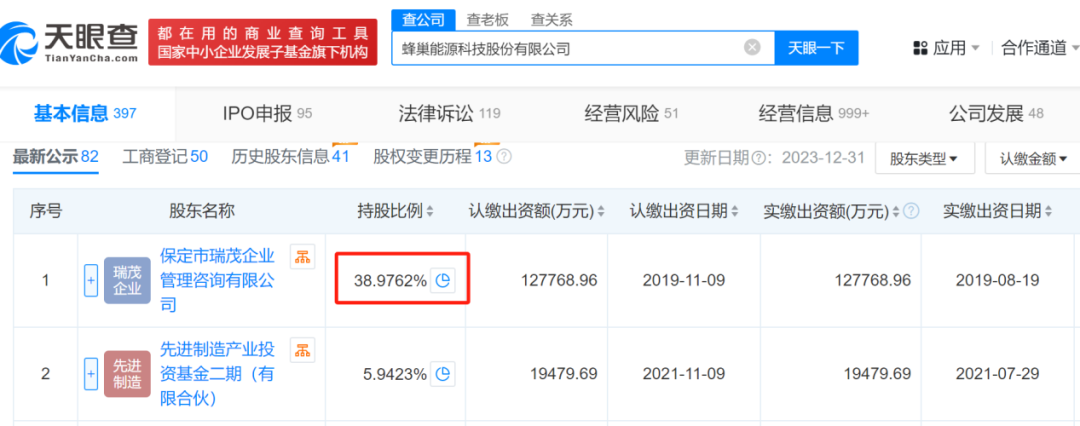

In 2012, Wei Jianjun foresaw the enormous potential of new energy vehicles. Under his leadership, Great Wall Motors upgraded its power battery project team in December 2016, forming the precursor to Hive Energy. In 2018, Hive Energy began operating independently, acquiring relevant patents, non-patented technologies, and other assets from Great Wall Motors. Initially, Great Wall Motors was Hive Energy's largest purchaser. According to Hive Energy's prospectus, its total revenue from 2019 to 2021 was 2.9 billion yuan, 17.36 billion yuan, and 44.74 billion yuan, respectively, with net losses of 326 million yuan, 701 million yuan, and 1.154 billion yuan, respectively, amounting to a cumulative loss of nearly 2.2 billion yuan over three years. In 2022, its total revenue was 9.97 billion yuan, with a net loss of 2.256 billion yuan, resulting in a cumulative loss of over 4.4 billion yuan over four years. Despite this, Hive Energy's compound annual growth rate has reached 139.62% in the past three years, with Great Wall Motors, as a related party, contributing the majority of Hive Energy's revenue. As Hive Energy's largest customer, Great Wall Motors contributed revenues of 812 million yuan, 1.649 billion yuan, and 3.661 billion yuan to Hive Energy from 2020 to 2021, accounting for 99.86%, 98.68%, and 86.37% of Hive Energy's total revenue, respectively. It is evident that Great Wall Motors was crucial to Hive Energy's initial revenue, which was almost entirely contributed by Great Wall Motors. Since 2021, the proportion of revenue has declined but still exceeds half. The Shanghai Stock Exchange specifically issued an inquiry letter, asking Hive Energy to clarify whether it has a single significant dependence on its related party, Great Wall Motors, and whether it still meets listing conditions after deducting related sales to Great Wall Motors. In 2022, Hive Energy's battery installation capacity was 6.10 GWh, accounting for 2.07% of the domestic market and ranking seventh. Its market valuation once reached 60 billion yuan. With the termination of Hive Energy's IPO, Wei Jianjun's plans have been disrupted. As early as November 2022, Hive Energy submitted its prospectus to the STAR Market and received acceptance. If Hive Energy had successfully listed, with a valuation of 60 billion yuan, Wei Jianjun's confidence would have increased, and he wouldn't have been so concerned about Great Wall Motors' profit situation. The question is, while Great Wall Motors can return to betting on fuel engines, will the market go back to what it once was?
This article is an original work by BT Finance and may not be used, copied, distributed, or adapted without permission. Any infringement will be subject to legal action.








